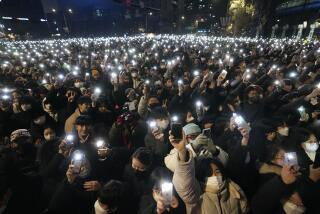New Year’s
- Share via
New Year’s Day is special for people all over. Whether it’s the Icelandic elf dance or the Chinese lion dance, there are many different kinds of celebrations. New Year’s Day isn’t necessarily Jan. 1; it can be in February, March or even September depending on what calendar is used. Explore New Year’s celebrations from around the world through the the direct links on the Times Launchpoint Web site:
https://www.latimes.com/launchpoint/
Level 1
Multicultural Calendar: New Year’s Day: The Vietnamese celebrate Tet, their Lunar New Year, in February, while Iranians have special festivities for the Persian New Year in March. Find out about new year celebrations from all over the world through these reports submitted by children.
https: //www.kidlink.org/KIDPROJ/MCC/getmcc.cgi? infotype=free&keyword;=new+year
Akemashie Omedeto Gozaimasu--Happy New Year!: O-Shogatsu is such an important holiday to the Japanese that they celebrate the coming new year for three days--January 1-3. Read about the food, the festivities and the traditions, such as the ringing of a special gong that wipes away the sins of the past year.
https://www.zuzu.org/japan.html
Billy Bear’s Happy New Year’s: New Year’s Day is a time to set goals for the coming year. Try an online goal-making game, print out your own New Year’s Day stationery and even make your own custom calendar.
https://www.billybear4kids.com/holidays/newyears/fun.htm
Level 2
Celebration of the Chinese New Year: The Chinese calendar follows the twelve-year cycle of the lunar calendar, which assigns an animal to each year. Read about the Chinese New Year festivities that occur in late January and early February and which include such customs as good-luck money given in red envelopes.
https://www.c-c-c.org/new/newyear.html
Happy New Year!!!: January gets its name from the Roman god Janus, a god with two faces who could look back at the old year as well as look forward to the year to come. Learn about lunar and solar calendars as well as some interesting customs from around the world and even a recipe for a happy new year.
https://www.geocities.com/Athens/Acropolis/1465/newyear.html
Today’s Date in Other Cultures: Jan. 1 will mark the beginning of 1999 in the Gregorian system, but currently it is the year 5759 according to the Hebrew calendar and the year 1419 based on the Islamic calendar. Compare fourteen different calendar systems through this handy online calculator.
https://www.cs.washington.edu/homes/dougz/date/
Level 3
New Year’s Celebrated Around the World: To have good luck in the new year, people throw pots out of windows in Italy, eat black-eyed peas and hog jowls in the Southern United States and jump off chairs at the stroke of midnight in Denmark. Explore different customs for New Year’s through a fun quiz and get some tips on how to keep your resolutions for the New Year.
https://archive.abcnews.go.com/sections/world/newyear_1230/index.html
World Calendars: When the new year actually starts depends on what calendar system you use. Learn about the history behind a range of calendars: the Gregorian, Jewish, Islamic, Thai, Japanese, Hindu, Ethiopian and Native American.
https://www.transimage.com/Cal/CalMain.html
New Year’s Day--History and Customs: The Babylonians in 2000 BC celebrated the new year on March 23 with the first day of spring and the planting of crops. Find out about holiday traditions from different cultures, including how a newborn baby symbolized the new year for such cultures as the ancient Egyptians and early Greeks.
https://wilstar.com/holidays/newyear.htm
*
EXPLORER’S QUEST: Who developed the first calendar that started on Jan. 1?
CLUE: See Happy New Year!!!
Find What You Need to Know: Have a project on California history? Need help doing a math problem? Launch Point now covers more than 50 topics for getting your schoolwork done. Go to https://www.latimes.com/launchpoint/ for the full list of subjects and direct links to the best Internet sites.
Answer to last week’s Quest: Climate, the availability and cost of materials, and the design and structural needs of the building
Launch Point is produced by the UC Irvine department of education, which reviews each site for appropriateness and quality. Even so, parents should supervise their children’s use of the Internet. This column was designed by Kimberly Kiang, Theresa Menzies, Vicky Shuttleworth and Anna Manring.
More to Read
Sign up for The Wild
We’ll help you find the best places to hike, bike and run, as well as the perfect silent spots for meditation and yoga.
You may occasionally receive promotional content from the Los Angeles Times.






